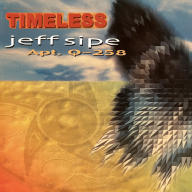Much of Sipe's activities have been centered around Atlanta, GA, although in 2003 he relocated to Brevard, NC. He was actually born in Berlin and in his early childhood moved around the globe frequently, including periods in both Thailand and Vietnam. To risk an "outing" somewhat below the security radar violated by certain political commentators, it is worth mentioning how unusual the career of Sipe's father was: the man was a makeup and disguise expert for the CIA. Musical memories rather than espionage haunted Sipe's early childhood, including a fascination with bell-ringing in Buddhist temples. After seeing Lionel Hampton performing on #The Tonight Show, Sipe was inspired to do something similar, perhaps a premonition that he would wind up working with a bandleader named Hampton, although not the grinning vibraphone master. Sipe finally learned to play drums while attending junior high school; at this point the family was living in Frankfurt, Germany, but Sipe's high school years were spent in the CIA-soaked atmosphere of Fairfax, VA.
Beginning with the progressive rock style of Emerson, Lake Palmer, Sipe followed a listening trail into jazz fusion territory, which introduced him to drum masters who would inevitably serve as his great influences, players such as Jack DeJohnette, Tony Williams, and Billy Cobham. In the second half of the '70s, Sipe began attending the Berklee School of Music in Boston, studying under Bob Kaufman, Bill Norine, Alan Dawson, and Lee Venters as well as establishing playing connections with a list of students who included Branford Marsalis, Bill Frisell, and Mike Stern. The drummer gigged in a wedding band with Victor Bailey and began the first fusion combo of his own, featuring guitarist Steve Vai.
Sipe's Boston period lasted until 1983, when he relocated to Atlanta, teaching at the Atlanta Institute for Music and meeting the previously mentioned Bruce Hampton through keyboardist Dan Wall. Bassist Oteil Burbridge and guitarist Jimmy Herring became involved in a band that came to be known as the Aquarium Rescue Unit. The compelling musical force that aficionados called ARU was at times lumped in with the jam band scene, but was unique among groups in this genre in terms of both repertoire and interpretation, taking vintage gospel ballads and playing them at breakneck speed, to describe one of many approaches to on-stage excitement.
Four albums and a calendar packed with live dates was the ARU legacy. In 1996, Sipe moved on to a collaboration with the Swedish bassist Jonas Hellborg and Memphis guitarist Shawn Lane. His reputation growing, the drummer was soon brought in to fill out the rhythm section in Leftover Salmon, another popular group on the jam band scene that played styles such as bluegrass and Cajun. Sipe's presence in this group was an extension of earlier attempts to bring drums into the bluegrass context, an innovation that had been considered controversial in groups such as the Osborne Brothers. Former bandmate Herring teamed up with the drummer on a project called Z, often referred to as Project Z, and Sipe also began gigging with Tedeschi. Zambiland Orchestra, an experimental big band that became known for year-end bashes in Atlanta, has involved members of Phish, Widespread Panic, Michael Ray the Cosmic Krewe, and the Derek Trucks Band, among others.
The drummer's first album as a leader, entitled Timeless, was scheduled for release in 2004. ~ Eugene Chadbourne, Rovi













